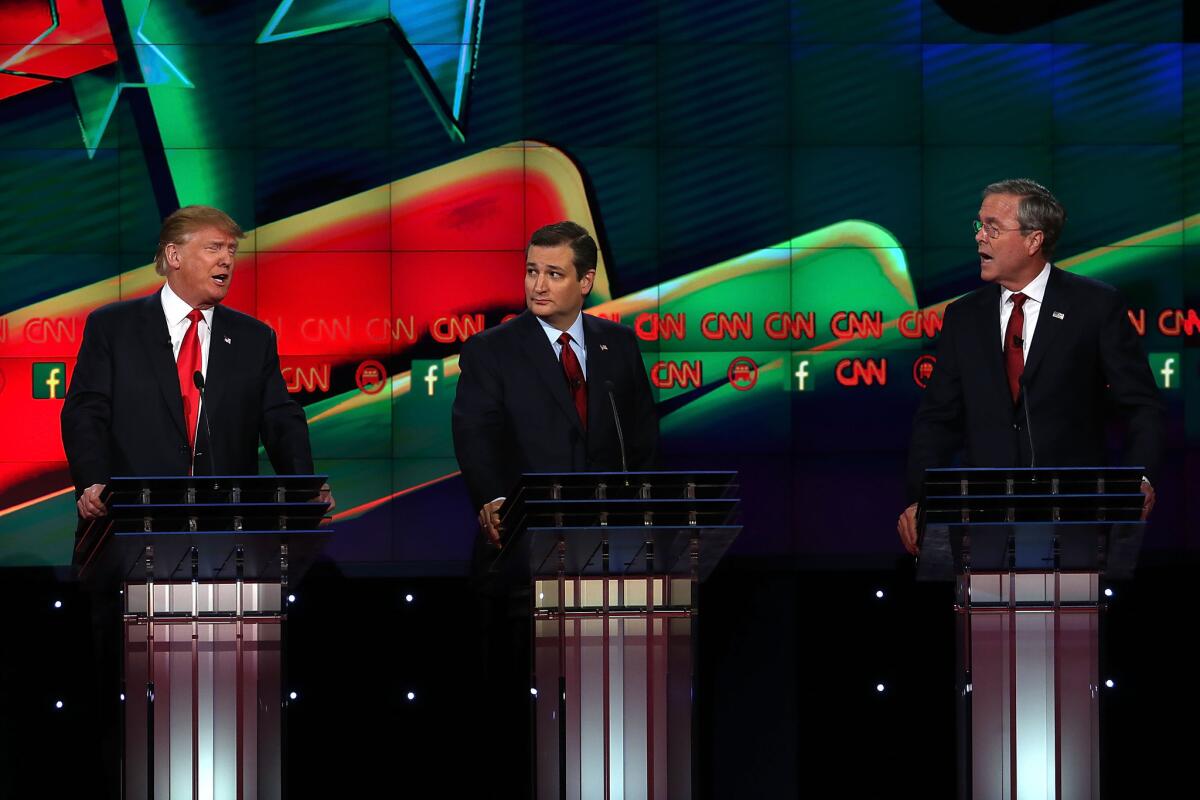Analysis: GOP Debates: We need an elimination round already

Republican presidential candidates Donald Trump, left, and Jeb Bush get personal during the CNN Republican presidential debate on Tuesday in Las Vegas.
- Share via
Wolf Blitzer and CNN made at least one thing very clear in Las Vegas on Tuesday night. The biggest problem with this year’s Republican debates was not manipulative moderators or “cage match” formats or even the rabid boorishness of Donald Trump.
The biggest problem with the Republican debates was the ridiculous number of candidates.
While one certainly does not want to compare presidential politics to reality television, there is something to be said for a progressive number of elimination rounds. The fact that 13 people are still running for the Republican nomination is no longer exciting, amusing or symbolic: It’s a logistical and narrative nightmare, at least when it comes to a national debate.
The decision to use polling numbers to break the candidates into two groups may have made sense in the first, and even second, debate, but by Tuesday’s fifth and final of the year, it was both embarrassing and weirdly ineffective: The candidates with the least public support got the better public forum. The “undercard” debate, between Rick Santorum, Mike Huckabee, Lindsey Graham and George Pataki was shorter and far more manageable; the candidates may have disagreed loudly and often, but they didn’t have to fight over the amount of oxygen in the room.
On the main stage, however, even the redoubtable Blitzer couldn’t always prevent acrimonious crosstalk, over-the-buzzer monologuing and “it’s my turn” complaints as nine people who each believe they should be president all jockeyed to have the last word and/or most memorable phrase.
The winner in both categories may have been, to the surprise of many, Jeb Bush, who quickly dubbed Trump as the “chaos candidate” and then answered Trump’s charge that his own campaign was “a total disaster” by observing that “you can’t insult your way to the presidency.”
Indeed, Bush briefly glowed with newfound energy as he gave voice to the GOP’s growing frustration with Trump, particularly in light of his call to ban all non-American Muslims from entering the U.S. But while Bush’s repeated insistence that Trump’s positions were not “serious’ provided brief catharsis, they also distracted from what was, at times, an actual discussion of policy rather than politics.
Galvanized by national security concerns raised by the attacks in Paris and San Bernardino, the candidates initially avoided personal spats in favor of detailed policy differences. Mark Rubio, Ted Cruz and Rand Paul in particular engaged in several spirited debates over immigration, privacy, information gathering and military response.
Then, inevitably, things would get heated—Cruz attacked Rubio’s conservatism, Chris Christie slammed congressional experience as meaningless and Trump reminded everyone repeatedly that Bush was way behind in the polls.
And this time no one could blame the moderator—Blitzer and his team were impartial, objective and determined to give everyone equal time, even if it meant corralling a particularly pugnacious Cruz who, like the Enegizer Bunny, just kept talking.
It would be easy to blame the personalities involved, and certainly Trump’s brand of vitriol adds a degree of difficulty, but really, it’s just a question of numbers.
It’s hard enough for nine people to have a meaningful conversation about the non-death of Glenn on “The Walking Dead,” much less a group of Alpha politicians debating the actual fate of the nation.
The evening’s topic—national secruity—gave the debate both a focused field and sense of urgency, but it also compounded the natural urge to compete, leading to battle rhetoric that often soared far above even the heartiest hawks. ISIS was the main target, and radical Islam in general, but also Mexico, China, North Korea and Russia. Vladimir Putin was threatened with a punch in the nose, and Chris Christie said he would shoot down a Russian plane even if it started World War III.
World War III. That certainly makes every American feel a little safer.
But then that’s the kind of thing that happens when the first primary is just a month away and you’re still trying to separate yourself from 12 other candidates, one of whom is Donald Trump and none of whom seem willing to throw in the towel.
MORE ON THE DEBATE
A tough night for Trump and political correctness: 5 takeaways from the Republican debate
Ted Cruz wants to ‘carpet bomb’ Islamic State, but with some limits
Fallout from terror attacks dominates Republican debate
More to Read
The complete guide to home viewing
Get Screen Gab for everything about the TV shows and streaming movies everyone’s talking about.
You may occasionally receive promotional content from the Los Angeles Times.







